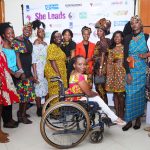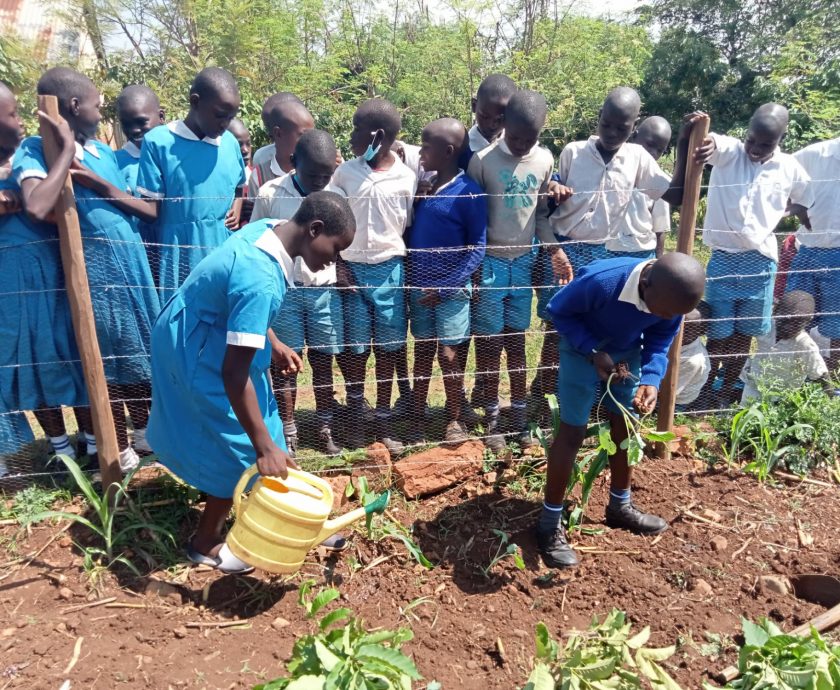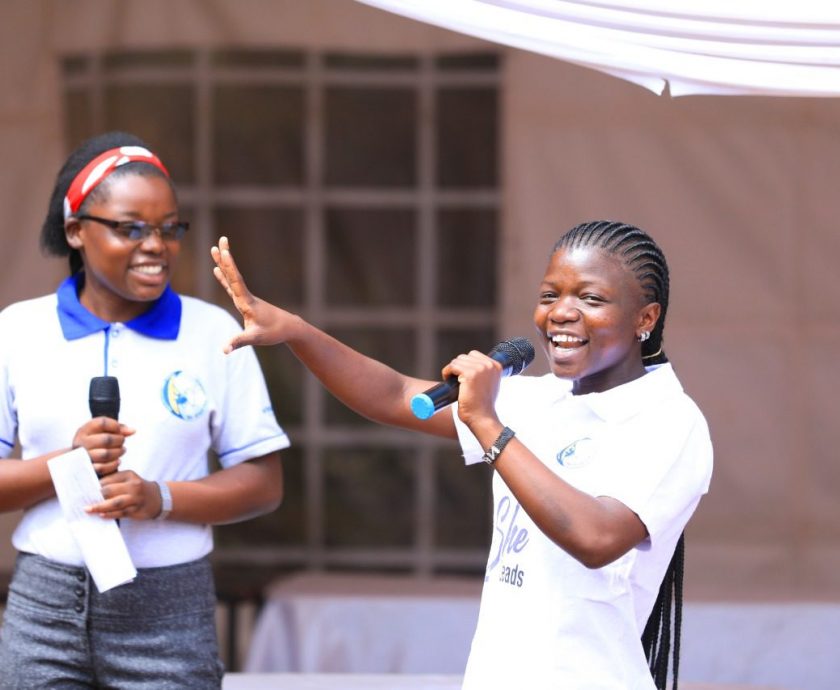Generation Equality 2021-Polycom Girls Perspective
The event marks the most significant international convening for gender equality since the 1995 Women’s Conference in Beijing. This is also a great opportunity for Kibera girls to listen to the commitments made by various presidents and heads of civil societies as the world commits to gender equality. Since Beijing Conference in 1995 tremendous efforts have been made by various countries in the commitments made then. However, more needs to be done, most especially in Kenya.
During the opening event, major commitments were announced by the Heads of State and Government of France, the United States of America, Kenya, Argentina, Georgia, Finland, Canada, Germany, South Africa, the European Union and from international organizations and private sector.
It is worth noting Worldwide, 45% of girls and women aged 15-49 who are married or in unions cannot make their own decisions about sexual and reproductive health and rights by deciding about healthcare, contraception and their own sexual practices i.e., saying no to sex.
The current state in Kenya is not any different with Data from the Demographic and Health Surveys show that almost 2 out of 10 girls between the ages of 15 and 19 are reported to be pregnant or have had a child already. In Kenya, 4 million about FGM girls and women have undergone FGM. Overall, 21 per cent of girls and women aged 15 to 49 years have been subjected to the practice.
Kenya’s progress towards abandoning FGM is strong compared to other countries in Eastern and Southern Africa. Nonetheless, eliminating FGM by 2030 across the country requires additional efforts.
In this aspect, President Kenyatta reiterated the countries commitment in ending female Genital Mutilation during his tenure and to end all forms of Gender Based Violence by 2030 as envisioned in the Sustainable Development Goals as well as the ICPD+25 promises. These are the two priority areas as Polycom girls that were outstanding.
[/vc_column_text][vc_row_inner][vc_column_inner width=”1/2″][vc_single_image image=”2336″ img_size=”full” alignment=”center” style=”vc_box_shadow_border”][/vc_column_inner][vc_column_inner width=”1/2″][vc_single_image image=”2332″ img_size=”full” alignment=”center” style=”vc_box_shadow_border”][/vc_column_inner][/vc_row_inner][vc_row_inner][vc_column_inner width=”1/2″][vc_single_image image=”2337″ img_size=”full” alignment=”center” style=”vc_box_shadow_border”][/vc_column_inner][vc_column_inner width=”1/2″][vc_single_image image=”2333″ img_size=”full” alignment=”center” style=”vc_box_shadow_border”][/vc_column_inner][/vc_row_inner][vc_column_text]As the girls engaged actively while watching the commitments made; what stood out for them was the commitment made by the President to end FGM as well as Kenya having a national strategy and resources to prevent and respond to Gender Based Violence.
It is worth noting that more action is required to finance girl led civil societies all towards championing for the rights and inclusion of girl voices in decision making spaces. As Polycom Development Project we laud all the organizers of Generation Equality as well as our partner FEMNET for engaging us in the conversation that propels our girls and opens them to world of opportunities.
Watching the girls following the proceedings and lauding the speeches and commitments this encouraged the organization to continue fighting and giving girls from urban informal settlements a voice and a platform through which they voice their concerns. Locally, we have the ‘talking boxes’ Initiative that needs to be scaled up to all institutions of learning.
In her remarks at the opening ceremony of the Generation Equality Forum in Paris, UN Women Executive Director Phumzile Mlambo-Ngcuka said: “Generation Equality is about change. It is about moving from making promises to telling us what you are going to do in order for the situation of women to change.”
We have moved from promises we want more action and more funding towards girl led initiatives.
A great speech by Yanda Branda-the Co-Chair of Transform Education in Africa inspired them. In her speech, what Polycom Girls resonates with are the various demands that includes having an inclusive education especially for teen mothers, demand for schools to be a safe space and free from GBV, adequate resources for managing menstrual hygiene and lastly which we amplify as an organization, girls need to be at the table they need to be part of the partnership, co-create decisions, and co-fund young women. One of the BEIJING Queens said that they should be the next face in such a platform. This we are grateful for the SHE Leads project that will ensure voices of girls and young women in decision making spaces
The budget cut on Gender agenda should not be discussed, money is enough and more allocation done towards ending Gender Based Violence.
Most young women’s economic rights have been affected by the COVID 19 and this has greatly impacted their access to decision making spaces. A great commitment of 160 million dollars was committed by Bill and Melinda Gates towards ensuring women are in key decision-making spaces this fund should reach grassroots women striving to elevate the status of young women voices.
This funding should be scaled to grass roots organizations such as Polycom Development who have the presence of GYWs and community presence in realizing the commitment of ICPD+25 promises as we connect to the GEF commitments.
The voices of East African girls and most specifically from Kenya should have been considered as well in the forum. This is to enrich the current voices of the two young women from the Southern part of Africa.
Furthermore, great commitments were made however, Polycom Girls feel the speech did not resonate with what they are going through. They fear that most of the commitments made at an international stage will not be implemented by the key actors.
With the grappling corruption, the girls feel most funding is redirected to other government ‘important’ issues. The girls feel that the President should visit or have a round table discussion with civil societies and see and feel the pain that most gender-based survivors go through.
They reiterated that more action and less research should be the focus of the president and not allocating money towards research. The data that the president has committed annual 1 million USD research fund and a GBV survivors kitty, this the girls feel should not be for research but more in developing response mechanism within counties.
More funding allocated towards this should be used in community sensitization and adopting of alternative practices to FGM and ensuring an end to GBV by 2030 as stated in the Sustainable Development Goals.
[/vc_column_text][vc_column_text]As an organization, the key two opportunities we have are;
- Our presence in the community
We are actively engaging the girls and young women towards accelerating the promises made during the ICPD+25 which are ending teen pregnancy, ending child marriage and ending FGM. All these are affecting our girls and young women from having meaningful engagement in the society.
- The Girls and Young Women
We as Polycom always pride in numbers. We are able to access a great number of voices from the girls and young women. With more resources, we can ensure the girls reach more platforms that are national and international. The SHE Leads project is one such that will ensure the voices of girls and young women, notable from marginalized areas are heard and the Government and policy makers challenged to make their promises.
Adoption of most Conventions
Kenya has ratified the ILO convention 190 among others that focus on fighting gender-based violence. This is an opportunity for Polycom Development to hold the Government responsible in implementing the convention in Kenya all towards ending GBV. Polycom Girls through its current projects will ensure that we engage the Government in all important engagements and hold the Government accountable in implementing all the commitments.
We need to ensure that democracy is at the frontline in achieving most of the commitments made by the current Government. Girl Led projects are being implemented by Polycom and we will provide a platform where the young women and girls will engage with the county decision makers. This will be a great feedback platform for the girls who know the commitments that the President has made in this year’s Generation Equality.
In conclusion, the voices of young women and girls should be shrouded in democracy and no discrimination. Women and girls in Africa most specifically Kenya, have undergone great challenges especially when it comes to dealing with patriarchy. Women and girls’ voices have not been included in key decision-making spaces especially on issues that affect them.
In her remarks at the opening ceremony of the Generation Equality Forum in Paris, UN Women Executive Director Phumzile Mlambo-Ngcuka said: “Generation Equality is about change. It is about moving from making promises to telling us what you are going to do in order for the situation of women to change.”
We call for more action and less promises. Many have been done since Beijing, ICPD +25 and now Generation Equality. More interventions and accountability mechanisms are needed.
THE ASKS
The girls were overjoyed and expressed enthusiasm as the listened to the various commitments made by each Head of Civil Societies and Presidents. Despite the darkness creeping in the girls were glued to the screen.
Thereafter they had an ask for the President as stated below?
The president should consider coming down at the grassroots and get feedback before making commitments. The President to allocate more money on prevention rather than research. Most Civil Societies have the data at the grassroot.
Thank you FEMNET for taking Kibera girls to Paris to witness the historic event that champions for the rights of women and girls globally.
We end with the words of Vice President of United States “Listen to those who are not being heard-respect those whose experiences are different and recognize those in the room, recognize those with a different story.”
[/vc_column_text][/vc_column][/vc_row]


